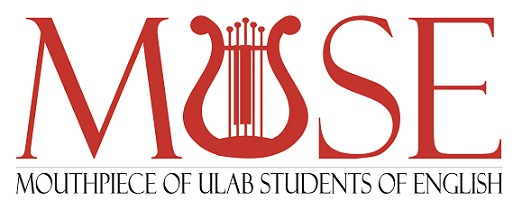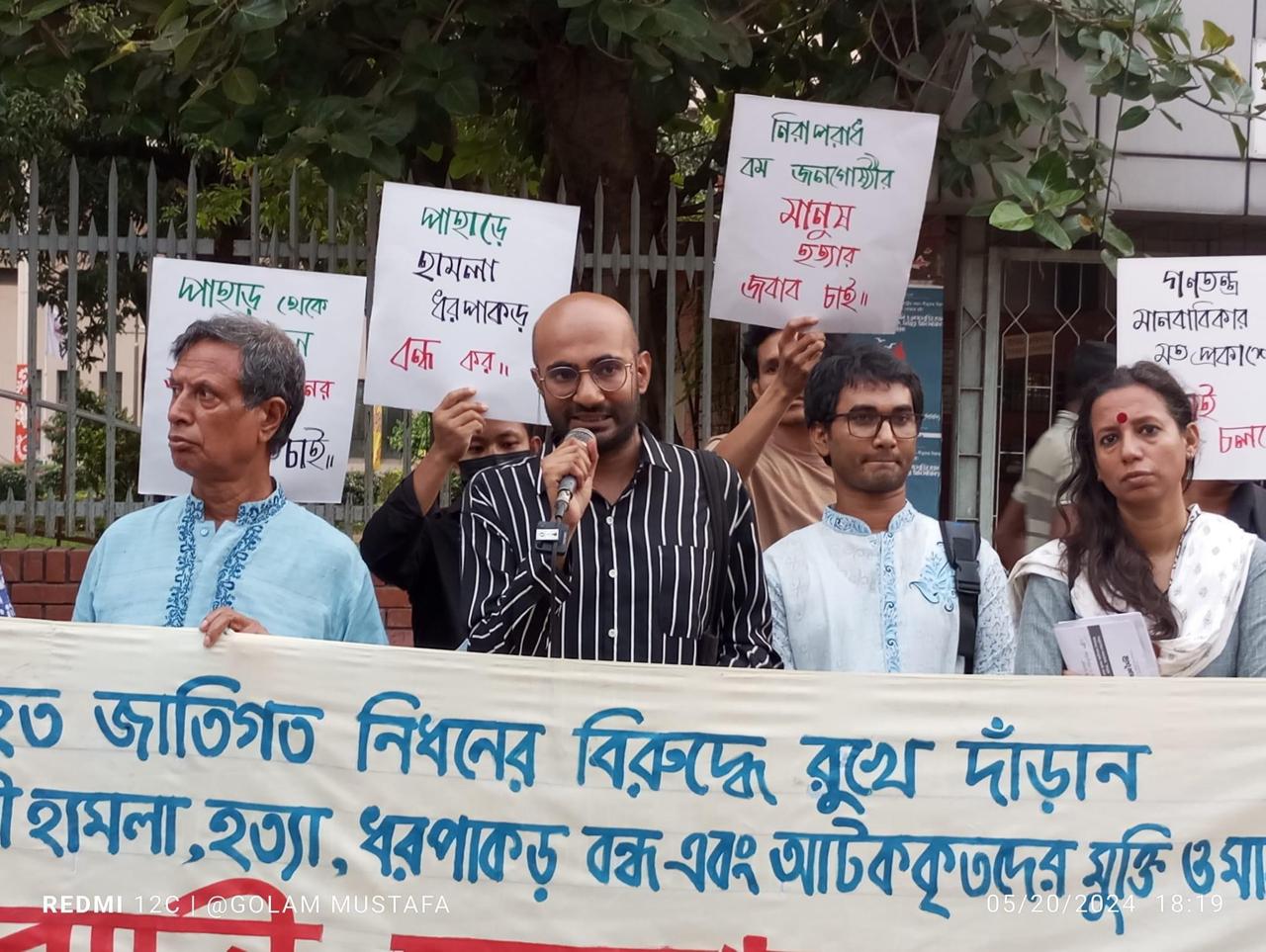Interview taken by Kashfia Nahreen and Transcribed by Sabah Srishty Rahman
For this issue of MUSE, Catalysts of Change, there was no one better to have an enlightening conversation with than DEH’s very own Oliur Rahman Sun! A visionary and creative in multidisciplinary fields, he is the co-founder of Bodhichitta, a Bangla archive of philosophy discourse, and a socio-cultural activist. He has only been a lecturer at ULAB for a little over a year but has already had a massive impact on the department. Join us in learning about the beginning of his journey as an academic uptil now!
Q1. How has your experience been teaching at ULAB? Are there any memories or experiences that stand out to you?
A. It’s been quite an interesting experience. Before I joined ULAB, I used to teach at Pathshala and the experiences I have gathered there and the student body are significantly different from ULAB. This is for a number of reasons. The students at Pathshala are already professionals, they are adults. At ULAB, even though you get some professionals at the Masters level but most students are just starting out. Secondly, the way the university is structured, in terms of policies, and because it operates under the Private University Act of 2010, there are certain constraints that affect the learning environment. Regarding our trimester system, there is a lot of background work that takes place within a very short span of time. This is an incredible amount of pressure on the faculty members and unfortunately, the workload that we take upon ourselves is often made invisible. One does not or perhaps cannot have these conversations with students in the classroom hence students are oftentimes unaware of the work that goes on in the background.
Other than these it’s been quite an interesting experience at ULAB. One particular moment has still stayed with me for quite some time now. It was during a “Cinema in Literature” course, and what we had do is have one class on the emergence of Bangladeshi cinema. For that particular class we screened a film by Alamgir Kabir called “Dhire Bohe Meghna.” The film was released in 1973, right after the Liberation War and it was about 71 as well. We had just started watching it and we were having a conversation about the film when suddenly one student started crying. I was very taken aback and tried to understand what was going on. I figured that it might have been emotionally troubling because of the theme, but the film did not really contain any scenes of violence. Then I found out that Alamgir Kabir was actually her uncle, so it was quite emotionally moving for her to watch one of his films in a Cinema course, which she never expected. I think this also goes back to our understanding of the curriculum as well. Students might have a presumption that they will only encounter materials that are coming primarily from the West or from an Anglo-Franco domain, so I think that has been quite interesting to dissect and deconstruct. We would also go to the Film Archive which is something that I have personally enjoyed a lot; the students, the way they would interact with the archive was also very interesting to look at.
Another interesting experience I had was during the July Uprising in particular. The way the larger community came together was very enriching to experience. The sense of solidarity that we witnessed during the uprising, with teachers always being ready to help the students whenever they were facing danger and trying to collect funds to provide for them, were surely commendable acts. And, at the same time this general concern they expressed for students as well, the love, the warmth, the affection that we all had towards each other was heart warming to say the least. Students were concerned about the teachers and the teachers were about the students, the mutual solidarity was very moving. I had also noticed that in the rally that we had organized in front of the university campus, there was an overwhelming number of English faculty members present, and I think we outnumbered any department there. That was interesting to see, and to also realize that they are all coming from the same sense of understanding and solidarity through which a sense of community is created, is very moving.
Q2. What is special about your teaching philosophy and what are the lessons that you hope to impart to your students?
A. I always try to contextualize the materials I teach and it has been one of my primary goals to actually make the things that they are learning real to them. I always encourage my students to contextualize their learning, even if we are reading 17th or 18th Century texts from an Anglo context, I always encourage them to make sense of that in the context of Bangladesh or in the context of 2024. I encourage them to think about what points are relevant to their understanding of the texts because I think we need to approach English education from that particular perspective. Questions like why are we studying texts from Francis Bacon written in the 16th-late 17th century are completely valid, in terms of when we are talking about decolonizing education, which in most cases starts at the English Department. That has been one of my primary targets, to encourage them to understand the relevance of these texts and question if they are relevant, and if they are relevant, in what terms are they so.
I also want them to connect that to larger structural issues that are tied to those conceptions. For example, if they are talking about women, the role of state, how different classes are interacting with each other, what sort of consequences of those conceptions are we looking at right now, in real life? Now this is easier in courses where you are primarily going through literary texts but since I also teach courses on Cinema, I try to retain the focus on the subcontinent so they understand what kind of narratives have emerged from this land, and that makes things more real for them. For example, we have been discussing Beder Meye Josna in our class a lot and it’s very interesting to see what kind of reactions and insights you get when you engage with a film like that, which is usually not even discussed in classrooms. We mostly talk about the films from the art film industry, about directors like Wes Anderson or Akira Kurosawa. So, that has been one of my primary targets: to expose the students to texts and materials that they would otherwise not encounter. If it’s not happening in the classroom they often will not go and access the material themselves, so they know that these things exist and it’s not the only set of texts and materials that we can venerate.
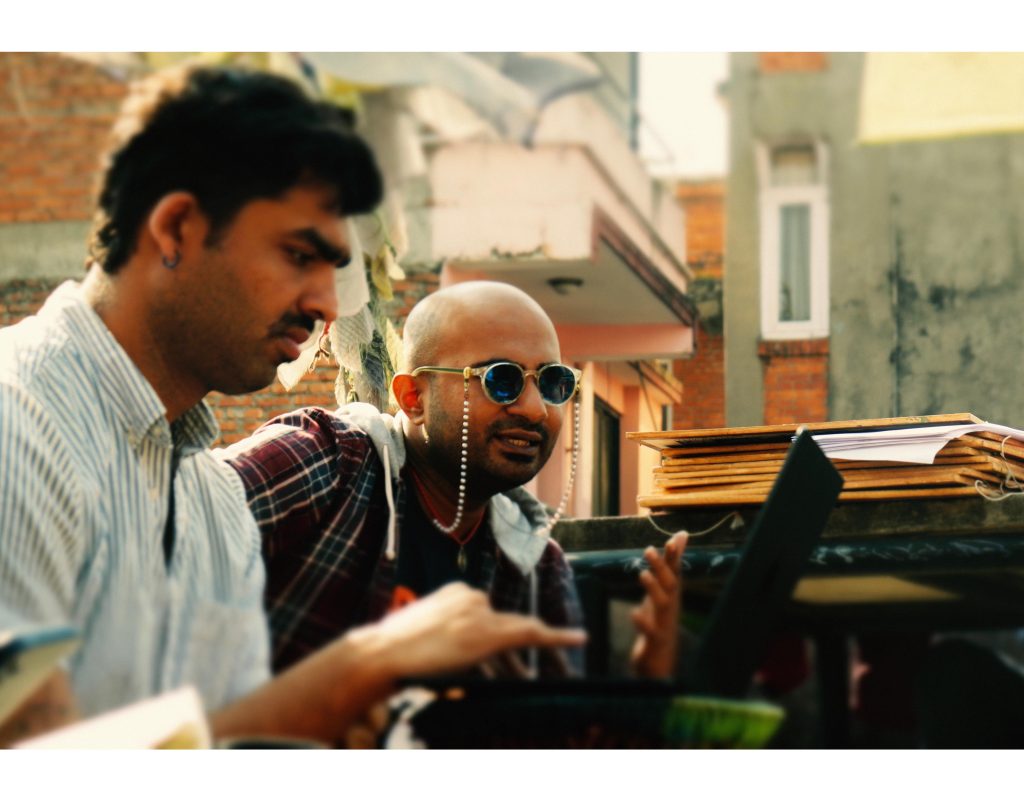
Q3. Could you please tell us about the Bodhichitta organisation and its significance as an archival organisation?
A. We started Bodhichitta when we were students. Ever since we were students, we’ve always been quite disillusioned with the way academia operates within the society and the larger role it can play in terms of shaping the general discourse. So, Bodhichitta became a platform for mitigating challenges like the kind of disconnection that we felt academia was creating or facing.
The name itself, “Bodhichitta”, is a word made up of two parts. So, “Bodhi” means intellect, and “Chitta” means consciousness, which is also a Buddhist concept. The idea of Bodhichitta is that it is held by Bodhisattvas, who are people who have sacrificed achieving Nirvana for the sake of their Shankha or community. That was something that resonated very well with us because our vision also stemmed from that sense of engagement between people.
That was also why we chose to operate Bodhichitta in Bangla; we decided to archive intellectual discourse and primarily Western epistemology in Bangla because we felt that it was only discussed within academic premises and that it remains largely removed from the rest of the society and particularly from Bangla-medium students. Only a very small segment of our society is conversant with English so they are left out when we have these conversations that are directly related to the way Western epistemology has emerged in English. And these are the things that are shaping our social discourse and political discourse so it is crucial to have a thorough understanding of these dogmas. So we thought that our conversation needed to take place in Bangla to offer greater access and we have felt that it was quite successful because we have received responses from not just Bangladesh but also from India, from West Bengal, and from Bengali-speaking communities all over the world. They have been watching our archive on Youtube and we would get lots of messages on our social media with notes of appreciation and how it has helped them understand something, and we have also received quite a few academic citations as well, so that was also quite interesting to see.
It emerged as a semi-academic platform although we strictly maintained to keep our discussions academic, and also tried to push for having these conversations in Bangla because then you also have to translate a lot of these concepts, which is another field that we were interested in; translating intellectual discourse in Bangla. When I was teaching at Pathshala, I taught one media course, ‘Media Studies and Cultural Theory’, and I predominantly had students from Bengali-medium, who were not comfortable, let’s say, reading an English book. But the problem was that all of the media concepts, the theories, including Chomsky, Stuart Hall, Gillian Rose, were all in English and they had a hard time understanding the concepts. They would ask me to translate and I realized we don’t have any translations of these concepts into Bangla. There are only two books that are available in Bangla on media studies, and that’s it!
That’s why we primarily thought of doing Bodhichitta in Bangla because we thought that it needed to be accessible to the larger public and we tried to kind of “de-academise” academic knowledge so it reaches the larger audience and they are also aware that these are things that exist, and they also have a space or a scope to engage with these thoughts so that they don’t remain in a cocoon within the society and really has a spillover effect.
Q4. You have been advocating for free speech by organising and curating talk shows and programs that challenge the status quo. Are there any challenges you have faced in organising these events?
A. When you operate, especially in the context of Bangladesh, there are several challenges when you try to organise things like these. The immediate one is, obviously, the fear of persecution. I was very much involved in student organising when I was a student, so I have experienced persecution before. There was a case that was filed against 53 students at Jahangirnagar University, and I was one of them. A few of our students got killed in a road accident in front of the University, so then we started pushing for safer roads, and students blocked the main highway in front of the University campus. There were negotiations that were being done, so the administration was trying to come up with plans to make the roads safer, but while those discussions were taking place, police already started attacking the students in front of the campus, and several students were injured. The students were obviously angry so then we went to the Vice Chancellor to hold them accountable. We were already having these conversations like “Why are police attacking us?”, and we knew that they were also firing rubber bullets, and tear gas shells, and they all landed inside the campus and because Jahangirnagar University operates under an act called Jahangirnagar University Act (1973), which gives the campus some autonomy, if the law enforcement agencies want to get into the campus, they have to take permission from the administration before they can actually do that, but that did not happen. So, the students were really agitated, and that agitation led to more confrontation, and then the response from the administration was to file cases against 53 students, which went on for 2-3 months, so that is just one example of the kind of challenges you may face.
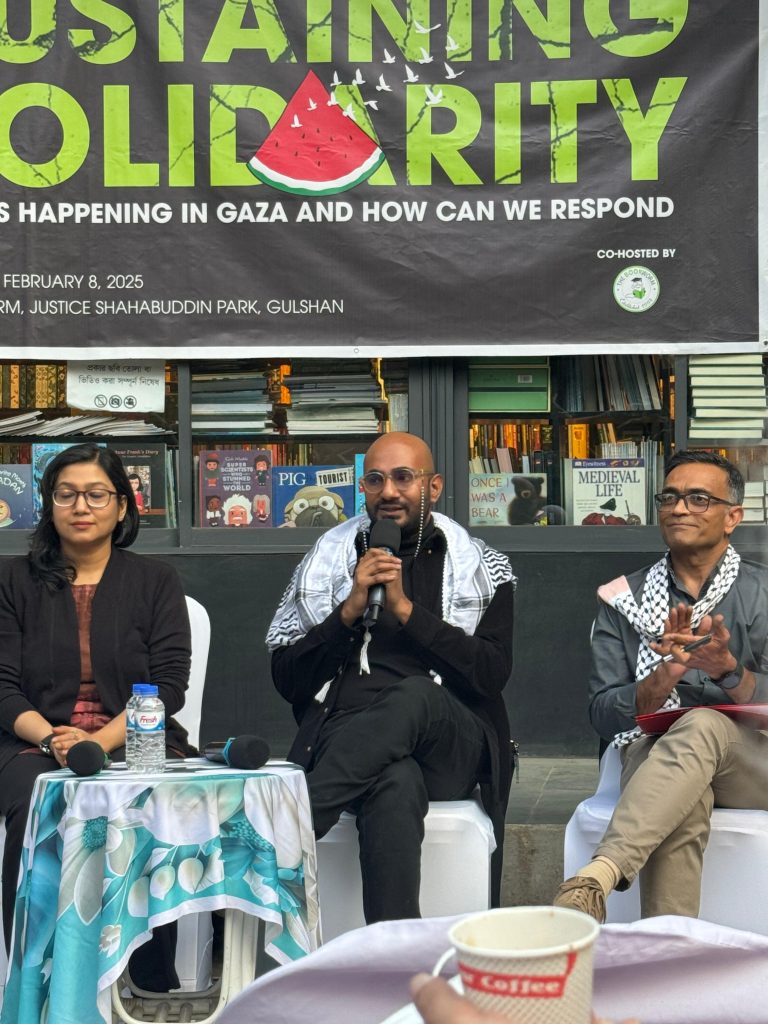
Another glaring example would be during the July Uprising. Right after we had organised the protest in front of the campus on July 31st, before I could even get back home, I got a call from one of our colleagues who was panicking and telling me the police were looking for me and I had been instructed to go into hiding or not stay at home at that night. Then I started receiving more calls from friends, colleagues, and even family members, all panicking. Even before that news got to me, my family members already knew. I think there was a call from the detective branch which was made to the university so then they alerted me, after which I had to go into hiding. I literally took a bus to Teknaf on that very night, and there was a night-time curfew that was going on, and I took a 12-13 hour bus ride all the way to Teknaf. I had to turn off my mobile phone, change the sim cards, and just stay there in hiding for 2-3 days because I was not sure what was going on.
That’s just part of what you have to be ready for whenever you are doing activism in Bangladesh, in particular, because the fear and the possibility of persecution are always there. I think that’s just part of the process because there is a larger cause that lies ahead of you, and you’re doing it for larger reforms, to address structural problems, or maybe just responding to a particular incident as well. But it’s not about you, and that’s why you also have to be ready to suffer for standing up for somebody else, or something that may not directly affect you. You have to really accept that possibility because otherwise, it can be difficult to make sense of it because you know you don’t deserve that persecution, but in reality, it is something that comes as a consequence.
So, these are just two examples of the challenges that I have personally faced, but other than that there are also larger factors that are sometimes ignored and that might include things like just falling out with people; not being able to be friends with certain friends anymore. You lose friends along the way, and that is one of the most difficult parts of activism. I have not yet been able to make sense of that totally because you can have certain disagreements, but these are the points when you are having real disagreements in terms of the course of actions that are taking place and whether you can support them or not.
I think it is also somewhat of an after-effect of Israel attacking Palestine. When the Palestine Genocide started to take place, a lot of people started to have these kinds of conflicts within their friendships. I can completely relate to that because I have experienced that personally. Sometimes you have to rework those differences in opinion, and you also have to play the role of educator which can be frustrating. So, it’s not just persecution coming from the state or law enforcement agencies but the greater personal cost, the kind of emotional turbulence that one has to go through is enormous. Your friends not remaining friends anymore is a great personal loss as well, and how you deal with that is also something that you need to have mechanisms for. We don’t really have much of an emotional support network for activists in our country, which makes things even more difficult. There are small communities but a large-scale emotional support mechanism doesn’t exist. So whom do you talk to when you lose friends, over having a difference in opinion in terms of, let’s say, whether Sheikh Hasina should open fire on the students or not? It becomes very difficult to deal with those kinds of issues.
Q5. During the quota reform protests, as you have mentioned, you were highly supportive of the students. Could you please share your experience of the Uprising and how you felt during the Revolution of July-August? Are there any key incidents that impacted you?
A. So, this is actually the second round of quota protests. Other rounds of quota protests took place after 2018, and that was also the year that the Road Safety Movement took place if you remember that.
When the second round of quota protests started to take place, I, myself, was a bit skeptical at the beginning in terms of the agenda because I think it comes from the larger structural problems. If we look at the desire of people, like getting a job, it would sound very petty, it’s not the only reason people want to get jobs. This comes with another scenario where you actually try to understand that there has been a concentration of privileges that have taken place in the society and those privileges can look like they are simply a quota system, just having been able or not having been able to get into those jobs because they are reserved for some people. In this case, a large chunk of jobs were reserved for family members of freedom fighters. There was also a great deal of corruption that was involved in terms of who was getting in, or who were qualified or not qualified as freedom fighters. I come from a freedom fighter’s family, so I know very well the kind of military cases of this scenario. One of my very own uncles, who was the secondary commander in one of the sectors, is not even on the list of freedom fighters, so I do understand the kind of military cases that go on in all of these issues. I do think that initially there was difficulty in understanding the goals that they were actually fighting for so it took the form of quota, but that’s just the facade. Behind that facade is the desire to not endorse the concentration of privileges; everybody having access to jobs, to opportunities.
This mindless desire for government jobs is also a symptom of that problem because you see the private jobs in our country are so precarious. You don’t have any safety nets, you don’t have any job security, you don’t have any other benefits in private sector jobs. You have these two great divides, public and private, in terms of job sectors. The public job sector is highly subsidised, there’s an increased amount of job security, and all kinds of protection, but then, on the other hand, you have this big private sector where most of the employees are working under precarious conditions, including white-collar jobs. This binary is something that I personally have experienced, and this has not created a good impact on society in terms of students’ education. When we were students we would see students rallying up at the library, not to read the books that were available in the library, but just to read the BCS guides, because that has become one of the most desirable things that they can achieve in life. So, you see, how you see yourself in life is something that’s also affected by the way these privileges are concentrated. If the private sector would only increase their job opportunities, their securities, their protection mechanisms, then people will obviously get attracted to that. Then what happens is it has another effect, which is that it can affect education directly. The students are not ready to study the subject that they signed up for, they only study BCS studies. These are two sides of the same problem.
When the movement started to take place, I think initially the demands were very simple, and I did understand the desires so there was a pretty good sense of solidarity where I was also aware of the context in which it took place. But then, the way the government handled these protests was something that you can’t support, I mean, starting to use live ammunition is something that you can’t just do in peaceful protests, so that’s something that was a big no-no, and we could not negotiate with that reality. And obviously, we have seen how the government quells protests over the last decade and all of them were quite deadly, some even went unreported. Starting from 2013 to 2019, we witnessed this series of protests that were very badly handled by the government, so this was also a similar kind of reaction but the intensity this time was completely unmatched, and that’s something that did not sit well with anyone. We were very outraged, horrified by the videos that were coming up on social media, being shared all over, including Abu Sayed’s murder, and Mugdho dying, and students at the private universities, particularly in Uttara, when they were getting attacked.
I was looking at those videos and I could not just sit back and watch, so one of the very first protests that we organised was actually under the banner of the University Teacher’s Network, and we decided to hold a demonstration at the Dhaka University campus on July 17th, in the very early days of protests. By that time the army was already deployed, and the Dhaka University campus was sealed so you could not get in. We bargained with the army, with the security officers, and staged the demonstration that day. There were only a bunch of teachers who were present and that was very difficult for us because we didn’t know where it was headed. We had no idea that the government would get toppled in less than a month and we didn’t know any outcome of the protests, but just as concerned academics and concerned citizens, we did our part. We had to make our voices heard and speak for the students because no one else was doing that. Then, fast forward, starting after July 18th, things escalated, the internet was shut down, and that became one of the most difficult periods in our life, but even then we kept trying to do our part.
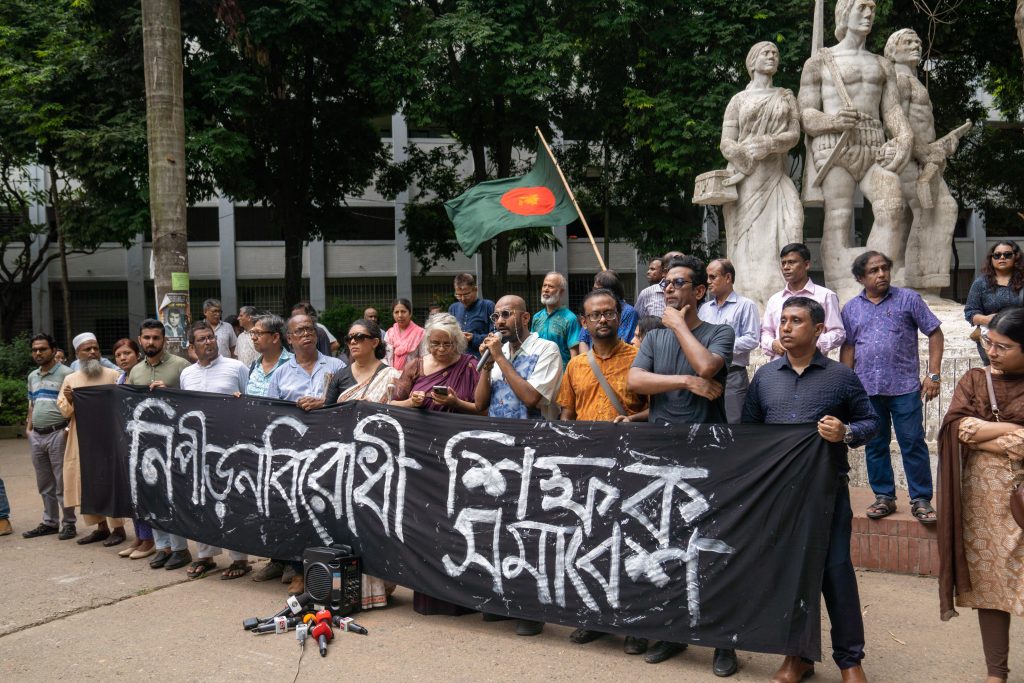
Photo: Habibul Haque/Drik
There was one lesson that we were able to get across because the internet was shut down so no one knew what was going on so what we did was we drafted a statement that was to be sent to the national organisations. Because the internet was not there, one of my friends called from the US and then we would read the statement aloud over the phone and he would type it down, and then that draft made it to a lot of international organisations, even news platforms.
Right after Abu Sayed’s death, we were also part of another demonstration which was organised by cultural activists in front of the Parliament and that was when the curfew actually was enforced. I think the weekend curfew ended in the morning and then would be enforced strictly starting from 6 pm. We again staged one demonstration in front of the Parliament and there were legible fears of attack. We saw these Student’s League goons, walking around with machetes, with sticks, and they were trying to round us up so we had to quickly conclude our protests, then we safely exited.
Then obviously the one that happened in front of ULAB was quite historical and we were all moved by Salimullah Khan’s speech which was also at a point of time when nobody was actually demanding the resignation of the Prime Minister or the government; everybody was still protesting the death of students, asking to hold the perpetrators accountable, police officers who opened fire, and such. At that point, no one was holding the government accountable and protesting that they had lost all legitimacy to perform the role of the government. I think that was quite interesting and historical to be part of and that was also one of the best memories of the protest, I would say.
Q6. Could you please share your observations about the students who risked their lives and their effort and impact in this uprising?
A. I mean, the students were at the forefront of the movement. They started it, they were the leaders. But, also, I wanted to add that; they were not alone, they were groups of people from all walks of life including the working class who were very active during the movement including rickshaw-pullers, van drivers, garment workers and madrasa students. Different chunks of society. If you really look at the death toll and their backgrounds, most of them are working-class people. I have personally gone to several hospitals and I remember this one experience of visiting CNH, this military hospital we have, and there was one ward full of students and people who were paralyzed from the waist down because the bullets hit their nerves, either at the backbone or maybe near the neck. I think the eldest patient we encountered was in Class 10. So, you can imagine the impact of that, because for the rest of their lives, they’ll be paralyzed and the caregiving work that they’ll need will need to be performed by their families who are already struggling to make ends meet. That was quite horrifying to witness and experience because they need a lifetime of rehabilitation support and I’m not sure if any government would be able to effectively follow through with that.
I see the immense sacrifice they have made for the betterment of the state of affairs and you know, there is so much hope in them. When I spoke to them, they were not dissatisfied, they were rather happy that even if it cost their lives, they were ready to make that sacrifice for the sake of this country. The love that they had for the land and its people was something that really inspires me, even to this day, and I think it will stay with me for the rest of my life. These are just kids who have sacrificed their whole life, I mean they will be bedridden, no doubt, and they will never recover from the damage that has been done to their bodies because of these bullets. So, I think we need to be mindful of the sacrifices that went behind the scenes, and not all of them are reported in the media. We talk about Abu Sayed and Mugdho, but we don’t see these people who were in the background, because they are very ordinary people who don’t really speak the kind of political discourse that we speak but in their aspirations, in their desires, that articulation and the desire for reform is very much present. That is something that I also feel very close to. That sense of ownership is something that has touched me.
Q7. As our conversation draws to a close, what would you like to convey to your students to inspire and motivate them?
A. They are the future of the nation and that is a role that comes with a lot of responsibilities. I would expect them to play a responsible role and realise their power because, I think, for a very long time, they haven’t understood the strength that they have. So, I would encourage them to be the brave soldiers who will march forward and we’ll follow them. They have to really examine the larger structural issues that need to be understood through a critical lens. Only emotions and passion will not work, we need to dissect to get to the roots of these problems. I want them to harness the strength that they hold because these are the people who are going to be the leaders of our country: social leaders, political leaders, and business leaders. They can also feel this as a burden but it is rather a motive that can push them to do better because there is always so much you can do. So, I think that’s something that I would personally want my students to realize.
